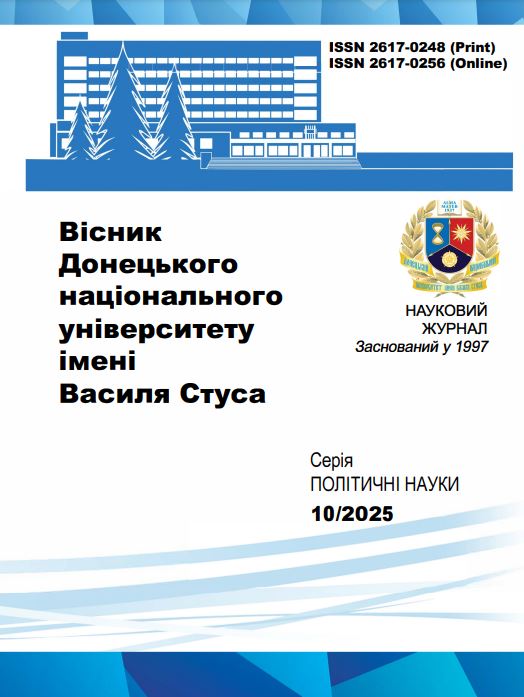Definition of the concept of «judicial integrity» in scientific dimension and in judicial practice
DOI:
https://doi.org/10.31558/2617-0248.2025.10.6Keywords:
integrity, judge, legislation of Ukraine, judicial system, corruption, justice, stability, political power, political process, political system, political institutions, political space, state structure, citizens' rights, legal culture, society, professional competence, international organizationsAbstract
The article presents a theoretical analysis of the concept of «integrity of judges» in the scientific dimension and judicial practice. The relevance of studying the issue of integrity of courts, which is important and necessary at any time and anywhere, is substantiated. First of all, this is related to ensuring the rule of law, the fairness of judicial decisions and public trust in the judicial system. The problem requires special attention in those countries where there is instability in the functioning of the judicial system or a high level of corruption. It is substantiated that the integrity and professional ethics of judges are directly related to the level of protection of citizens' rights, which forms the general legal culture in society. The integrity of judges in the political context is considered as a critically important aspect of the functioning of the rule of law, since judges play a key role in ensuring justice, the rule of law and compliance with the Constitution. It is emphasized that the integrity of judges is related not only to their professional qualities, but also to how they interact with political institutions, political forces and society. Compliance or neglect of integrity among judges can have a significant impact on the stability / instability of the political situation in the country, the level of trust in state institutions and the effectiveness of justice in general. The key concept of «integrity» in Ukrainian legislation is considered and it is shown that it officially does not have a universal definition, but its use can be seen in regulatory legal acts that regulate the activities of judges, civil servants, educators and other categories of professions associated with a high level of social responsibility. At the same time, the main emphasis is placed on moral and ethical norms that should ensure honesty, objectivity and responsibility in professional activities. The issue of judicial integrity is interdisciplinary and attracts the attention not only of lawyers, but also of experts in ethics, sociology, politics, as well as international organizations that are trying to create global standards to ensure fairness and transparency of judicial processes.
References
Аналіз практики Вищої ради правосуддя щодо оцінки поведінки судді/кандидата на посаду судді на відповідність вимогам доброчесності та професійної етики. URL: https://hcj.gov.ua/sites/default/files/field/file/analiz_praktyky_vrp_shchodo_kryteriyiv_ocinky_etyky_i_dobrochesnosti.pdf
Буртник Х. Доброчесність суддів аналіз практики Верховного Суду. Фундація DEJURE. 2021. URL: https://dejure.foundation/dobrochesnist-suddiv
Глущенко С. В. Новели судової реформи: поняття професійної етики та доброчесності в контексті кваліфікаційного оцінювання судді (кандидата на посаду судді). Часопис цивільного і кримінального судочинства. 2016. № 6. С. 70-83.
Грищук О. Доброчесність судді через призму сучасних соціальних трансформацій. Слово Національної школи суддів України. 2020. № 1 (30). С. 6-21.
Експертна дискусія на тему: Доброчесність як інструмент оцінки професіоналізму суддів, прокурорів та правоохоронців: перспективи уніфікації підходів, організована Центром політико-правових реформ. URL: https://www.ukrinform.ua/rubric-presshall/3914046-dobrocesnist-ak-instrument-ocinki-profesionalizmu-suddiv-prokuroriv-ta-pravoohoronciv.html
Закон України «Про Вищу раду правосуддя» від 21 грудня 2016 року № 1798-VIII. URL: https://zakon.rada.gov.ua/laws/show/1798-19#Text
Закон України «Про державну службу» від 10 грудня 2015 року № 889-VIII URL: https://zakon.rada.gov.ua/laws/show/889-19#Text
Закон України «Про запобігання корупції» від 14 жовтня 2014 року№ 1700-VII. URL: https://zakon.rada.gov.ua/laws/show/1700-18#Text
Закон України «Про освіту» від 5 вересня 2017 року № 2145-VIII. URL: https://zakon.rada.gov.ua/laws/show/2145-19#Text
Закон України «Про судоустрій і статус суддів» від 2 червня 2016 року № 1402-VIII. URL: https://zakon.rada.gov.ua/laws/show/1402-19#Text
Кладченко А. О. Правові засади впровадження інституту доброчесності в Україні. Jurnaul Juridic national: Teorie si Practica. 2016. № 6 (22). P. 9.
Кулібаба А. Поняття доброчесності як ключовий критерій у процесі добору на посаду суддів. Підприємництво, господарство і право. 2018. №2. С.212-218.
Постанова Великої Палати Верховного Суду від 10 листопада 2022 року по справі № 9901/355/21. URL: https://reyestr.court.gov.ua/Review/107533714
Савчин М. Moral integrity (моральна цілісність, доброчесність) суддів як складова правової держави. Слово Національної школи суддів України. 2019. № 2 (27). С. 6-22.
Тофтул М. Г. Сучасний словник з етики. Житомир: Вид-во ЖДУ імені Івана Франка, 2014. 416 с.
Хавронюк М. Вісім складових доброчесності: як їх правильно визначити Конкурсній комісії і конкурсантам. URL: https://pravo.org.ua/blogs/visim-skladovyh-dobrochesnosti-yak-yih-pravylno-vyznachyty-konkursnij-komisiyi-i-konkursantam/
Transparency International Ukraine. URL: https://ti- ukraine.org/

